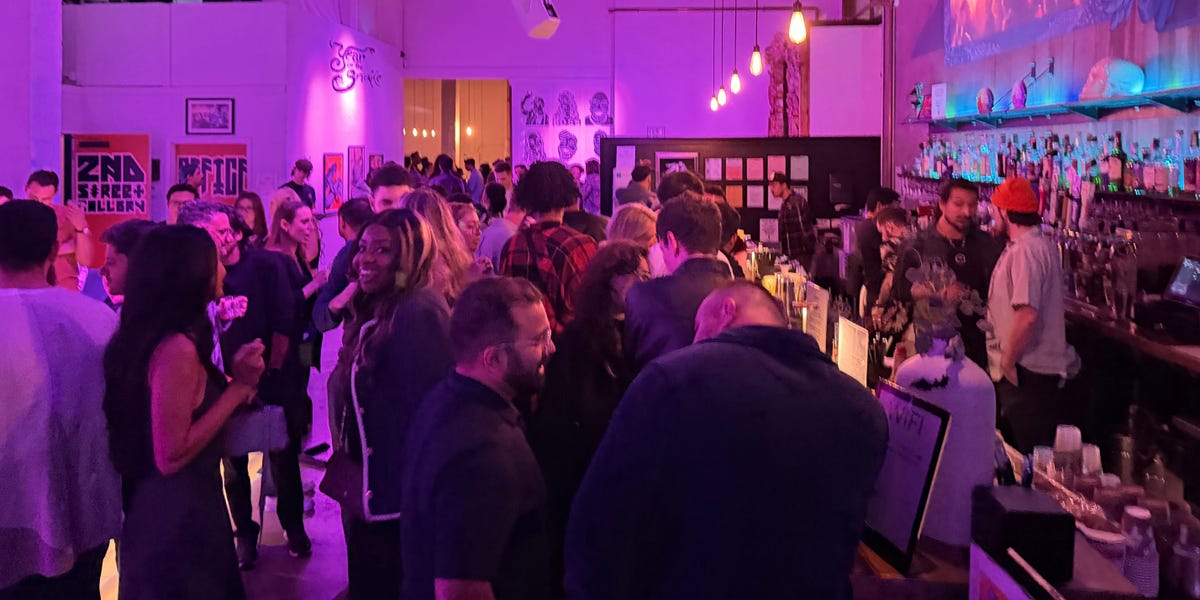What a difference a year makes.
At last year’s San Francisco Tech Week, OpenAI was valued at just $157 billion, and there were questions about whether the technology had truly left the doldrums of the post-COVID downturn behind.
Today, OpenAI has reached a high valuation of $500 billion. AI has gone mainstream and is fueling investor frenzy in all kinds of startups. Good times are returning in tech, and San Francisco is the hot center of it all.
“There’s an energy this year that I haven’t seen in a long time,” said Gwyneth Borden, founder and CEO of Remynt, a financial technology startup. “There’s a lot of optimism and exuberance. The promise of what AI can do to transform people’s lives is very exciting.”
Borden, with the cool wind blowing through his hair, spoke under the Golden Gate Bridge, on the bow of a ferry that had been rented by Menlo Ventures and other investors so the founders could mingle while watching the Blue Angels practice. Below deck, the founders loaded Styrofoam plates with meatballs and raw vegetables.
“Founders + Backers Cruise: Angels Over the Bay” at SF Tech Week 2025. Ben Bergman/BI
The air show ended up being canceled due to the government shutdown, but Jerry Shu didn’t seem to mind. He was admiring the view of the city, feeling exuberant after raising millions for his Boston-based AI company, Daylit.
“They’re not buzzwords anymore,” Shu said. “Before, the products were more talked about, but now you can feel how strong it’s going to be. There has probably never been a better time to be a founder than today. »
Andreessen Horowitz first organized SF Tech Week in 2022, primarily to serve as a marketing vehicle for the mega-venture capital firm more commonly known as a16z. The first version was smaller than the Los Angeles or New York versions.
“Many have written off SF – empty offices, headlines about decline,” a16z partner Katia Ameri wrote in an email to attendees earlier this week. “Many asked why we wanted to have SF Tech Week! Then AI hit escape velocity. Companies took up millions of square feet, rents went up, hacker houses returned.”
This time around, with over 1,500 events, San Francisco Tech Week is the largest of the three. The only question is whether the city, where it’s difficult to go to a coffee shop without hearing an AI agent, needs a week dedicated to technology.
“Everyone who lives here said it was like any other week in San Francisco,” said Amber Trivedi, who came from San Diego to try to find investors for her startup, LifeSpark Labs. “But it’s great to have multiple events to make it worth the trip.”
The events ranged from robot yoga, “a fun experience blending movement, machines, and mindfulness to question what it feels like when technology enters a space usually reserved for trust and vulnerability,” to a Wednesday party in SoMa promising a guest list of “founders, VCs, and operators who ship fast, love big shows, and aren’t allergic to a dance floor.”
One of the highlights of the week was a16z’s Speedrun Demo Day, where 61 founders, chosen from 14,000 people, were given two precious minutes to pitch their startup.
“More than 90% of our companies were very AI-focused,” said Joshua Lu, investing partner at a16z. “We are in a technology supercycle with AI.”
Whether early in the morning or after midnight, it was hard to find events where AI wasn’t the dominant theme.
“It’s a bit of a gold rush,” said Joanne Chen, general partner at Foundation Capital. “You could say valuations are too high and investors are too enthusiastic.”
Chen paused before adding: “People realize there will be a lot of winners, but also a lot of losers.”










